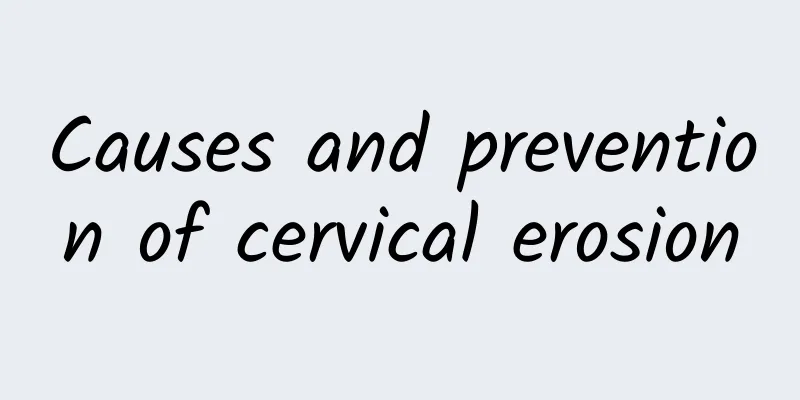Causes and prevention of cervical erosion

|
The main causes of cervical erosion include chronic inflammatory stimulation, fluctuations in hormone levels, improper sexual life, excessive cleaning or infection. Its prevention requires focusing on a healthy lifestyle and regular gynecological examinations. Chronic cervicitis is the most common cause of cervical erosion. Long-term inflammation can cause damage to the cervical mucosa. In addition, physiological factors such as increased hormones during pregnancy may induce erosion; early, frequent or unhygienic sexual intercourse leading to damage to the sensitive area of the cervix is also one of the causes. Some women also cause erosion due to the abuse of vaginal washes, which destroys the normal environment of the cervix. Pathological factors such as multiple births, incomplete cervical recovery after miscarriage, or exposure to high-risk viruses (such as HPV infection) may also cause cervical erosion. The actual manifestations are increased leucorrhea, lumbar pain, etc., and in severe cases, accompanied by contact bleeding or abnormal menstruation. Chronic cervicitis is the most common cause of cervical erosion. Long-term inflammation can cause damage to the cervical mucosa. In addition, physiological factors such as increased hormones during pregnancy may induce erosion; early, frequent or unhygienic sexual intercourse leading to damage to the sensitive area of the cervix is also one of the causes. Some women also cause erosion due to the abuse of vaginal washes, which destroys the normal environment of the cervix. Pathological factors such as multiple births, incomplete cervical recovery after miscarriage, or exposure to high-risk viruses (such as HPV infection) may also cause cervical erosion. The actual manifestations are increased leucorrhea, lumbar pain, etc., and in severe cases, accompanied by contact bleeding or abnormal menstruation. Prevention of cervical erosion needs to start from daily life. Maintain good personal hygiene habits and avoid abusing cleaning products; have regular gynecological examinations, especially women who have sex can have a cervical smear test or HPV screening every year, which can effectively prevent the development of the disease. Appropriately moderate sex life and pay attention to safety measures such as using condoms to reduce the risk of infection. Diet is also helpful. Eating more fruits and vegetables rich in vitamin A and vitamin C can promote the repair of cervical mucosa. People who engage in manual labor or sit for a long time should avoid long-term squeezing of the abdomen to reduce uterine blood circulation disorders. Seek medical intervention in time when abnormal symptoms are found to prevent further deterioration of cervical erosion. |
<<: Is cervical hypertrophy a precancerous lesion of the cervix?
>>: How long does it take to get pregnant after laparoscopic surgery for ectopic pregnancy?
Recommend
How to prevent acute cervicitis?
Cervicitis can be clinically divided into acute a...
Can a thick endometrium cause cancer?
The main incidence of endometrial cancer is menop...
Experts analyze several reasons for irregular menstruation and heavy bleeding
"What are the reasons for heavy menstrual bl...
What are the health care methods for women suffering from menopause?
Menopause is a common problem for female friends....
Obesity not only shortens one's lifespan, but also makes one old and bedridden. Reducing these three values can help the elderly live longer and safer.
Cardiovascular disease Among the top ten causes o...
Promote cancer-preventing fruits and vegetables! Tomatoes are great eaten raw with the skin on
In the hot summer, you should eat more red fruits...
Is the injection for uterine fibroids effective?
Are injections for uterine fibroids effective? 1....
Learn how to lose weight like celebrities! Remember these 8 slimming secrets
Models, stylists, designers, public relations, ed...
The following content is an introduction to the preparations before abortion:
The phenomenon of abortion has become more and mo...
What are the symptoms of uterine fibroids? Will uterine fibroids reduce menstrual flow?
There are many causes of uterine fibroids, most o...
Analysis of the best treatment for hyperprolactinemia
The concentration of prolactin in the blood is ma...
Symptoms of cervicitis
Regarding cervicitis, some people think that it i...
Can vaginal ultrasound detect adnexitis?
The B-ultrasound examination of acute pelvic infl...
Experts talk about the cost of painless abortion
Many people want to know the cost of painless abo...
Can a left ovarian cyst turn into a tumor? What should I pay attention to?
Ovarian cysts have no obvious clinical manifestat...









